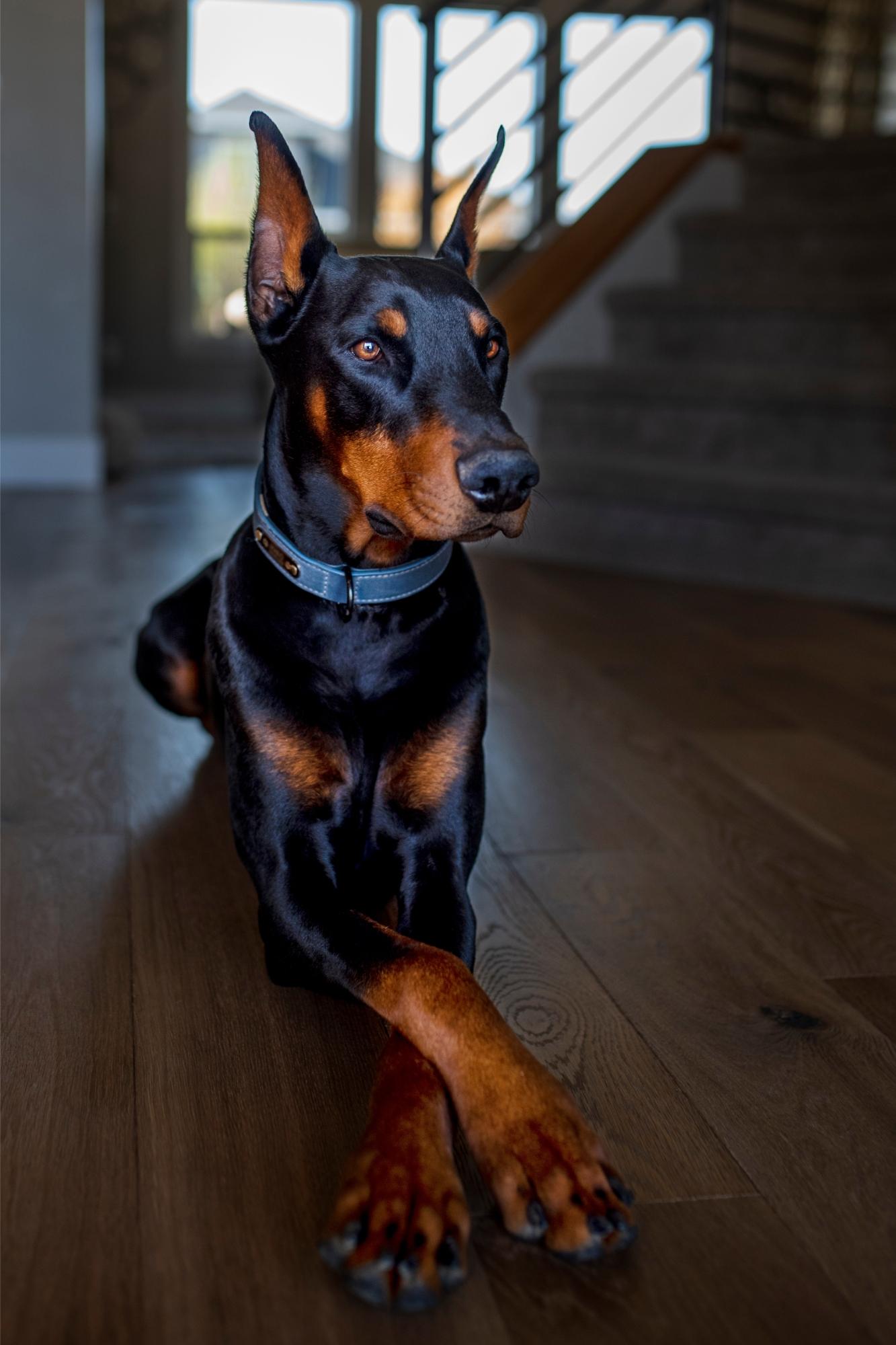DOBERMAN PINSCHER
| Group: | Working |
|---|---|
| Size: | Large |
| Temperament: | Brave, loyal, and vigilant |
| Height: | 26-28 inches (male), 24-26 inches (female) |
| Weight: | 32-45 Kg (male), 27-41 Kg (female) |
| Life Expectancy: | 11-13 years |
| Origin: | Germany |
| Coat Length: | Short |
| Coat Type: | Smooth |
| Color: | Black & Rust Blue & Rust Red & Rust Fawn (Isabella ) & Rust |
About
The Doberman is unquestionably an aristocrat among dogs, with a sleek coat, an athletic frame, and a great demeanor. Their muscular pace and wedge-shaped head complete their commanding presence. This family dog's obedience and loyalty blend power and charm. This breed is well-known for being a town or country house dog and is regularly employed in security and law enforcement capacities. Dobermans want to be part of a busy family.
Nutrition
The Doberman needs to be fed premium dog food for the duration of his life. The breeder or vet should recommend an age-appropriate diet for the Doberman puppy. Treats can be a valuable training aid, but giving them in excess can lead to obesity. Discover which foods fit the bill for canine consumption and which don't. If you have any worries about your dog's weight or diet, consult your veterinarian. Fresh, clean water in ample supply should be accessible at all times.
Ideal Meal Breakdown
Protein
32
Fat
17
Carbohydrates
43
Others
8
Exercise
The Doberman is an active athlete who requires a lot of playtime and exercise. A large fenced area where he can run is essential for the physical and mental health of a Doberman, who will enjoy taking his owner on long daily walks or hikes. Canine sports like obedience, tracking, and agility provide mental and physical exercise as well as enjoyable times for both dog and owner.
Grooming
The Doberman is primarily a "wash and wear" breed, but regular grooming will keep him in top shape. His coat will stay shiny and healthy with a daily quick brushing with a short-bristled brush or grooming mitt. He doesn't require frequent baths. He should regularly brush his teeth and have his nails cut at least once a month. Every few days, the ears should be thoroughly cleaned; a little baby oil and a paper towel are helpful for this.
Training
Dobermans are highly intelligent, quick learners, quick thinkers, and loving and entertaining companions. However, because they are such powerful dogs, they risk growing up to be pushy, destructive, and difficult to control. Both obedience training and early socialisation are essential. Classes for puppy training are also highly advised. Every Doberman owner has a duty to see to it that their dog is raised to be a contented, well-behaved friend and canine citizen. The Doberman should never spend extended amounts of time outside; instead, he should live indoors with his family.
Health
Although Dobermans are typically in good health, the breed is prone to a few diseases. One of these is bloat, a digestive disorder that can be fatal. Owners should become familiar with its symptoms and know what to do in its event. Hip dysplasia, dilated cardiomyopathy (enlarged heart), von Willebrand's disease (clotting disorder), progressive retinal atrophy, albinism, and hypothyroidism are a few genetic health conditions that can affect the breed.
History
Since the creation of money, one thing has always been true everywhere and at all times: The tax collector is never an invited guest. In some parts of Germany in the 19th century, the reception was outright hostile. Louis Dobermann, a tax collector and dog breeder from the town of Apolda, was well aware of this. He hoped to create a powerful, dependable protector to follow him around. A bigger, less refined version of the pinscher that bears his name today was created by Dobermann. The "Tax Collector's Dog" quickly became known throughout the world as the best working dog. Dobermans have proven themselves to be excellent search-and-rescue dogs, police and military K-9s, therapy dogs, service dogs for the disabled, and athletes in dog sports.
